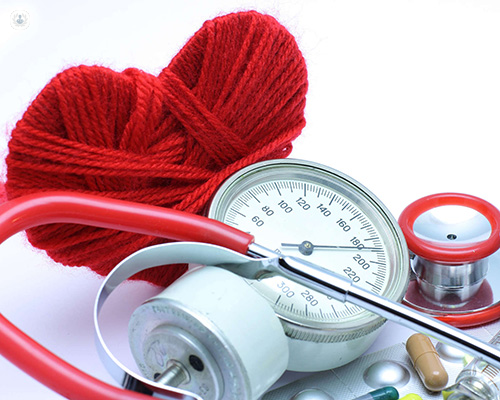High stakes: navigating the complex world of hypertension and how to keep your blood pressure in check
Written in association with:Hypertension, commonly known as high blood pressure, is a prevalent condition affecting millions of people in the UK. It is often referred to as a "silent killer" because it rarely causes symptoms but can lead to serious complications, such as heart disease and stroke, if left untreated.
What is hypertension?
Hypertension is a medical condition in which the blood pressure in the arteries is consistently higher than normal. Blood pressure is measured in millimetres of mercury (mmHg) and consists of two numbers:
- Systolic pressure: the top number, which measures the pressure in your arteries when your heart beats.
- Diastolic pressure: the bottom number, which measures the pressure in your arteries when your heart rests between beats.
A normal blood pressure reading is typically around 120/80 mmHg. Hypertension is diagnosed when blood pressure is consistently 140/90 mmHg or higher.
What causes high blood pressure?
There are several factors that can contribute to the development of hypertension. Some of the most common include:
- Lifestyle choices: poor diet, lack of physical activity, smoking, and excessive alcohol consumption can all increase the risk of developing hypertension.
- Obesity: being overweight or obese places extra strain on the heart and blood vessels, which can raise blood pressure.
- Age: blood pressure tends to increase as people age due to the natural stiffening of the arteries.
- Family history: if you have close relatives with hypertension, you may be more likely to develop it.
- Medical conditions: conditions like diabetes, kidney disease, and sleep apnoea can contribute to high blood pressure.
Why is hypertension dangerous?
Hypertension, if left untreated, can damage the arteries and organs, increasing the risk of serious health problems. Some of the major complications of uncontrolled high blood pressure include:
- Heart disease: hypertension is a leading cause of heart attacks and heart failure. High blood pressure forces the heart to work harder, which can weaken it over time.
- Stroke: high blood pressure can lead to a stroke by damaging blood vessels in the brain or causing clots to form.
- Kidney damage: the kidneys rely on healthy blood vessels to filter waste from the blood. High blood pressure can damage these vessels, leading to kidney failure.
- Vision loss: hypertension can damage the blood vessels in the eyes, resulting in vision problems or even blindness.
How is high blood pressure diagnosed?
Hypertension is diagnosed through regular blood pressure measurements. A healthcare professional will use a blood pressure monitor to assess your readings over time. You may be asked to track your blood pressure at home as well, especially if your readings are borderline.
In addition to blood pressure measurements, your doctor may recommend tests such as:
- Blood tests: to check for conditions like diabetes or kidney disease that can affect blood pressure.
- Urine tests: to assess kidney function.
- Electrocardiogram (ECG): to evaluate heart health and detect any abnormalities.
What lifestyle changes can help lower blood pressure?
Making lifestyle changes is one of the most effective ways to manage hypertension. Here are some key strategies:
- Healthy diet: a balanced diet that is low in salt, saturated fats, and processed foods can significantly lower blood pressure. The DASH (Dietary Approaches to Stop Hypertension) diet is a well-known plan that focuses on fruits, vegetables, whole grains, and lean proteins.
- Regular exercise: physical activity strengthens the heart and helps reduce blood pressure. Aim for at least 150 minutes of moderate exercise per week, such as brisk walking or swimming.
- Limit alcohol: drinking too much alcohol can raise blood pressure. It is recommended to limit alcohol intake to no more than 14 units per week for both men and women.
- Quit smoking: smoking damages blood vessels and raises the risk of hypertension. Quitting smoking can have an immediate and positive effect on blood pressure.
- Weight loss: if you are overweight, losing even a small amount of weight can help lower blood pressure and improve overall health.

Are medications necessary for managing hypertension?
In some cases, lifestyle changes alone may not be enough to control high blood pressure, and medication may be required. There are several types of blood pressure medications, each working in different ways:
- Diuretics: help remove excess sodium and water from the body, reducing the volume of blood and lowering blood pressure.
- ACE inhibitors: relax blood vessels by blocking the formation of a hormone that causes them to narrow.
- Calcium channel blockers: prevent calcium from entering the cells of the heart and blood vessel walls, relaxing and widening the arteries.
- Beta blockers: Reduce the heart rate and the force of the heart’s contractions, lowering blood pressure.
It’s important to follow your doctor's recommendations if medication is prescribed. Many people with hypertension require long-term treatment to keep their blood pressure under control.
How often should I monitor my blood pressure?
If you have been diagnosed with hypertension, it’s important to monitor your blood pressure regularly. Your doctor will advise you on how frequently to check it, but many patients benefit from home monitoring. This allows for tracking progress and ensures that treatment is working effectively.
Home blood pressure monitors are readily available, and your healthcare provider can recommend one that is suitable for your needs.
When should I seek medical help?
You should seek medical help if:
- Your blood pressure remains high despite making lifestyle changes.
- You experience symptoms such as severe headaches, chest pain, shortness of breath, or vision changes, which may indicate a hypertensive crisis.
- You have concerns about your blood pressure readings or side effects from medications.
Hypertension is a serious condition, but with proper management, it can be controlled, reducing the risk of complications.


